The title of this disc of piano music by Swiss composer
Baer and several of the pieces on it were inspired by the work of the
"sunpainter" P.K. Hoenich. They are among the most impressionistic pieces
on a selection which runs, in terms of influence, from Debussy and Ravel
through Messiaen to the Second Viennese School and back. It is something
of a stylistic melange and means that the individual pieces within supposedly
related groups often seem anything but; however, the music is generally
very listenable but, unfortunately, much less memorable. The earliest
pieces, dating from the ’sixties, are the most "avant-garde" but hardly
difficult to listen to, if requiring slightly more concentration.
The meat of the disc is, I suppose, the three sets
of Passagen, each group of three pieces dating from the 1990s,
although they are not represented in either forward or reverse chronological
order. Interspersed with these works are the previously mentioned 1960s
efforts and the most recent work, 2000s Erscheinungen (Visions),
the longest single track on the CD which reminds me in places of a more
energised but less disciplined Mompou; whatever, at fourteen minutes
plus it comes across as a more substantial piece than most of the works
here.
The composer's own notes are informative, in terms
of the generation of each piece, but there is a slight hint of name
dropping - admittedly, one piece is actually called Epitaph for Anton
Webern (why not Le Tombeau de?) but Bach and Wagner are also
name-checked, as well as the aforementioned Hoenich and Swiss religious
hero Zwingli. Taken in isolation, there is no single piece here that
I minded hearing. However, comparing for example with two artist programmes
of mixed repertoire (Thomas Adès on EMI and Elena Riu on Linn),
I found the latter just as stylistically consistent as this single composer
disc, i.e. to these ears, as intimated above, I could have been listening
to Webern one minute, Debussy the next. As with Adès I was juxtaposing
Grieg and Nancarrow, and with Riu, Pärt and Sculthorpe. My favourite
sequence here was, by far, the Passagen II, where despite the
relative disparity of styles, the music appears far more urgent and
communicative than elsewhere. I have been listening to a lot of piano
music recently (Rzewski, Nielsen, Casella etc.) and, although I have
enjoyed listening to this disc more than once, Baer can hardly be described
as being among the front rank in this idiom.
Neil Horner

